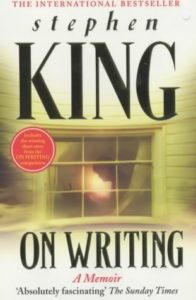
I love King’s book On Writing, and recommend that you read it. I wouldn’t say every writer has to write like him, his advice can be genre specific and even he says you need to work on your own style. But he does give some good advice for writers that cross genres, and after reading a dozen books full of clichés lately creative writers clearly need to read his book. Here are some top tips for your writer’s “toolbox”.
Omit needless words
The number one rule. Write as you will, then in the editing stage go back and cut out the words that get in the way of the story you are telling. Editing people’s work I sometimes find they have stated something twice where one strong verb would do. So this is the point to choose your words wisely. Your word choice defines you as a writer.
Grammar
Get a firm grasp of the basics. If you don’t understand a rule there are ways of writing and avoiding them for example, I recently read The Uncommon Life of Alfred Warner in Six Days (Juliet Conlin) and there was not one colon or semicolon in the whole thing! At the same time, remember in fiction it is occasionally okay to write in broken sentences if it suits what you are trying to get across. Add a verb to a noun and you have a complete sentence. Even if it’s only to say: trees wept.
Avoid the passive
The meeting will be held at 7 o’clock or the meeting’s at seven.
The second is more solid. Of course there are times when you want a person’s action to be passive or to speak in a convoluted way to annoy other characters. So I’d say write however you write, make it active, then go back and consider what might need to be passive.
Be careful with adverbs (the -ly words)
It’s best to avoid the with dialogue tags. For instance, he said meniceingly. Can be shown better through speech: “Don’t you dare or I’ll pound you into the ground,” he said.
Description
Enliven the reader’s senses. This is ‘not just a question of how to, you see; it’s also a question of how much to’ and ‘in a way that will cause your reader to prickle with recognition’ (King, pp.136-137). The next tip is crucial to decide what you prefer in terms of description balanced with dialogue.
What does description consist of? Largely, locale, texture, and character description which can be a mixture of straight and poetic description to avoid stilted prose. King’s style is to give a few very well chosen details and move on. As well as to avoid clichés.
Read, and then read some more.
King says, “One learns most clearly what not to do by reading bad prose” and the same for good fiction. You can learn a lot from reading and paying attention. He suggests turning off the TV and replacing that time with reading.
Here I’ve listed a few of Stephen King’s tips. TO know more check out what he says about vocabulary on page 86, and dialogue on page 142.
Further reading
The Elements of Style, E. B. White
Words Fail me, Patricia T. O’Conner
If you’re looking for a proofreader to help polish your final manuscript please get in touch.
Who is Emma?

Emma is a proofreader with 18 years of writing experience with businesses, academics and creative writers. She obtained a Creative Writing MA (St Andrews University) and a PhD in Storytelling (Warwick University). Then set up her own proofreading business and became a published author of fiction as well as academic literature such as Young People, Learning & Storytelling (Palgrave Macmillan).


0 Comments